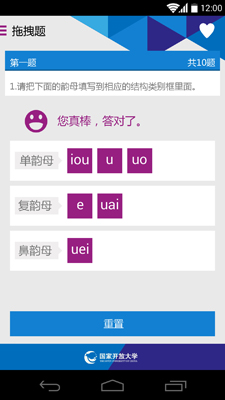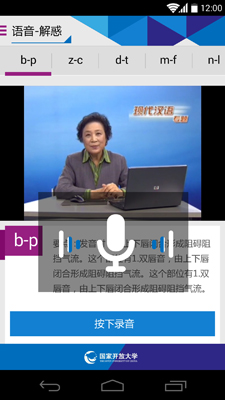 On November 25, 2015, the first mobile learning course through the Open University of China (OUC), the Special Subject of Modern Chinese Language, was examined and approved by an expert panel. The expert panel included researcher Guo Longsheng, from the Ministry of Education’s Institute of Applied Linguistics, Professor Zhang Fumei, from Langfang RTVU, Xu Cheng, Assistant Professor at Beijing Jiaotong University, and Associate Professor Xu Changwei, from the OUC.
On November 25, 2015, the first mobile learning course through the Open University of China (OUC), the Special Subject of Modern Chinese Language, was examined and approved by an expert panel. The expert panel included researcher Guo Longsheng, from the Ministry of Education’s Institute of Applied Linguistics, Professor Zhang Fumei, from Langfang RTVU, Xu Cheng, Assistant Professor at Beijing Jiaotong University, and Associate Professor Xu Changwei, from the OUC.
 The mobile resources for the Special Subject of Modern Chinese Language were developed jointly by the School of Arts & Law and the Department of Teaching Resources Management. At the meeting, the expert panel listened to a report made by the subject group, and viewed and experienced a course demonstration. After that, they fully affirmed the mobile learning resources of Special Subject of Modern Chinese Language and unanimously approved the course. According to the expert panel, the subject team led by Associate Professor Hu Jicheng, from the School of Arts & Law, explored well both course teaching design and user experience. It was concluded that the course’s resources fully reflect the OUC’s leading role in distance education, as well as its capacity and its level of development and design of prospective learning resources. They also suggested that the OUC’s capable departments accelerated social promotion of the research on the Special Subject of Modern Chinese Language’s mobile learning resources. The high quality learning resources benefit both the public and the open university system, helpful in enhancing and expanding both social awareness and the OUC brand.
The mobile resources for the Special Subject of Modern Chinese Language were developed jointly by the School of Arts & Law and the Department of Teaching Resources Management. At the meeting, the expert panel listened to a report made by the subject group, and viewed and experienced a course demonstration. After that, they fully affirmed the mobile learning resources of Special Subject of Modern Chinese Language and unanimously approved the course. According to the expert panel, the subject team led by Associate Professor Hu Jicheng, from the School of Arts & Law, explored well both course teaching design and user experience. It was concluded that the course’s resources fully reflect the OUC’s leading role in distance education, as well as its capacity and its level of development and design of prospective learning resources. They also suggested that the OUC’s capable departments accelerated social promotion of the research on the Special Subject of Modern Chinese Language’s mobile learning resources. The high quality learning resources benefit both the public and the open university system, helpful in enhancing and expanding both social awareness and the OUC brand.
Guo Longsheng summarized the course with four words: "innovation, responsibility, service, and future." He noted that the Special Subject of Modern Chinese Language team is full of innovative spirit. Using advanced technologies, the team developed the mobile-based course resources by exploring learning resources that meet the fragmented demands of mobile learning. From the perspective of students, the team made fine adjustments in the course’s design and user experience, with each link of the course considering and fully reflecting a sense of responsibility and service. The experts hoped the course would not only be available to RTVU students, but also to learners in the general public. They suggested that, in the future, the OUC should consider promoting a universal version of the course, making it applicable for the general public and exploring a charging mode where necessary.
It took the subject team two years to research and develop mobile learning resources. After many discussions and demonstrations, the team divided the contents of the junior college course into five modules, which include pronunciation, vocabulary, grammar, rhetoric, and characters. Five independent Apps were developed, one for each module. Learners can pre-install one or more Apps, according to their needs and interests. These Apps are unique in design, light and smart in structure, and easy for students to operate. In addition, the App has powerful interactive features, such as allowing individual ordering of initial and final exams, recording, tagging, taking notes, adding favorites, downloading, practicing, and other functions, all of which are easy for students to learn by themselves.
In recent years, with the emergence of cloud computing technology and the popularity of smartphones and tablets, distance education research tends to focus on mobile devices that are convenient for learners to use anywhere at any time. How to provide learning resources and services that cater to the mobile environment has become the main focus of mobile learning research. At present, some domestic and foreign research institutions have carried out a few experiments. For example, a photography technology and art course at Beijing Normal University, mobile education games at Athabasca University, and personal training assistant system from Université de Lille 1 Sciences et Technologies are all attempting to use sensors or QR codes to provide personalized content or services based on learners' location information and their surrounding environments, so as to create seamless learning spaces. The mobile learning resources in the OUC’s Special Subject of Modern Chinese Language course are designed to meet the growing demand for mobile learning, while striving to exercise its demonstrative effects in the transformation of distance education.
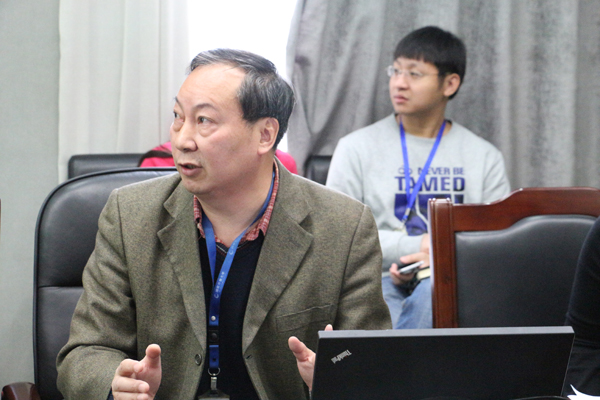 Hu Jicheng introduces the course to the expert panel.
Hu Jicheng introduces the course to the expert panel.
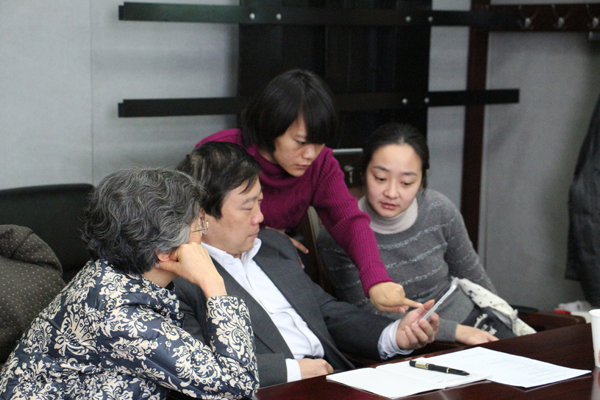 Researcher Guo Longsheng (second from left) and Professor Zhang Fumei (far left) experience the course.
Researcher Guo Longsheng (second from left) and Professor Zhang Fumei (far left) experience the course.
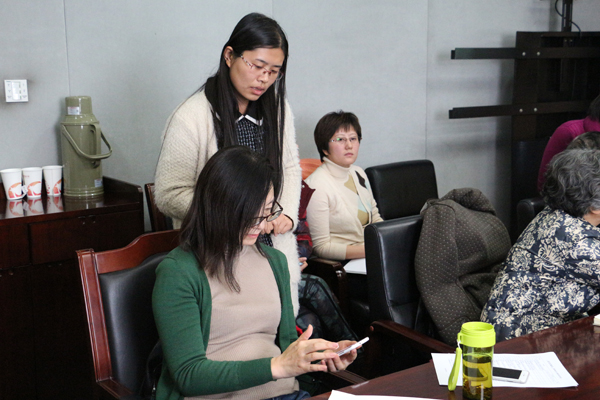 Associate Professor Xu Cheng partakes in the course.
Associate Professor Xu Cheng partakes in the course.
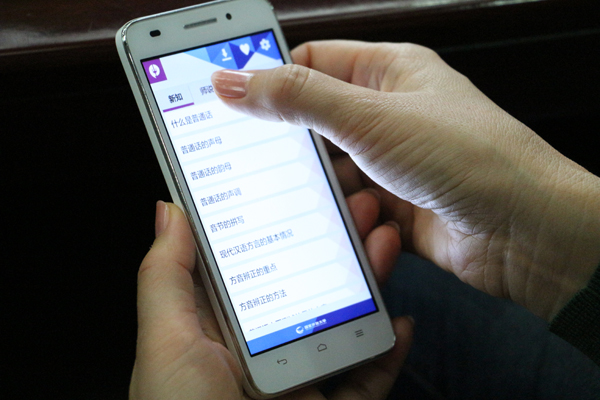 Experts appraise the course.
Experts appraise the course.
|
|
|
Course Test Course video playback and recording
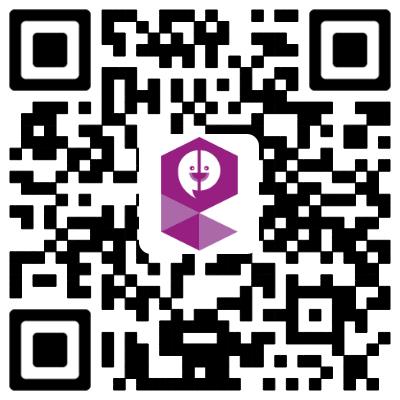
Android-based mobile users can sweep the QR code to experience the trial version of the mobile course Special Subject of Modern Chinese Language: Pronunciation.
By Zhou Xiang, OUC
